Free Summer Promise Program Gives Rising High-Schoolers Taste of College Life
July 28, 2024
- Author
- Jay Pfeifer
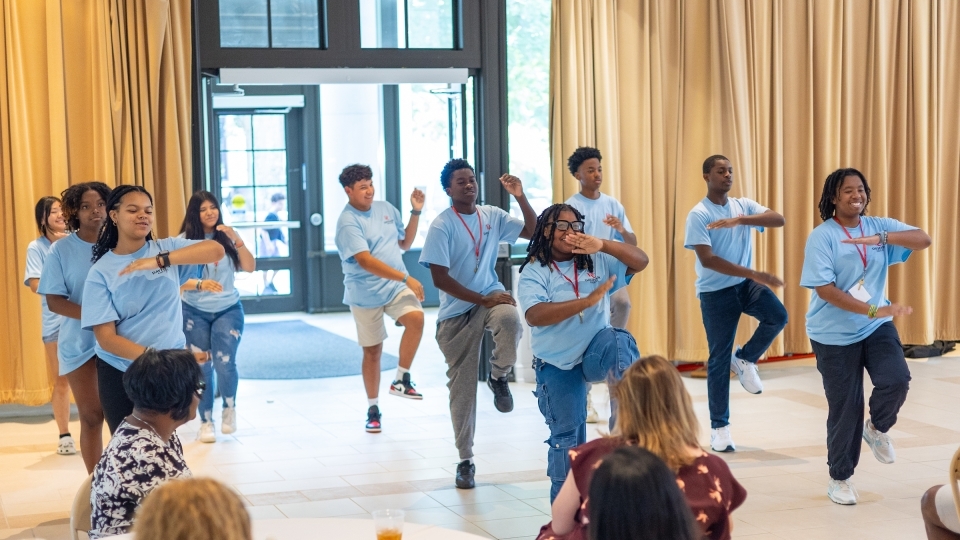
Passing in front of Chambers Building in late June, a faint, rhythmic thump might have caught your ear and drawn you into the lobby.
There, the din would have only grown louder as you climbed the stairs to a third-floor classroom. Inside, professor Andrea Duhon and 10 rising ninth-graders were out of their desks, stomping their feet, clapping and shouting as they learned a step routine.
Step is a form of percussive, synchronized dancing that combines footsteps, clapping and cheers in a wildly satisfying – and loud – performance.
Duhon, however, is not a dance instructor. She is a math professor who uses step to teach coding concepts. On the white board at the front of the room, Duhon had written what looked like an algebraic expression: (T4-3)4,B,C,A,F. Each letter corresponded to a step cadence that, when combined with the others, coalesced into a 30-second routine.
Her students were part of the inaugural Davidson Summer Promise Program, a free, week-long preview of college life for 30 soon-to-be high-schoolers, most of whom were from the Charlotte area.
From Sunday to Saturday, they lived in dorms, ate in Vail Commons dining hall and took classes in Chambers. At night, they participated in activities with other campus organizations like Davidson Outdoors and the Theatre Department. And, of course, they had some free time to hang out.
In other words, they were college students for a week.
“The Summer Promise Program is special because not only does it give students an opportunity to have a clear picture of what it means to be a college student from an academic perspective, but they will also be exposed to other opportunities,” said Tracy Bailey, an educational studies professor at Davidson and the lead organizer of Summer Promise. “Students will walk away with an idea of exactly what's involved in living on a college campus and what's involved in being successful academically in the classroom.”
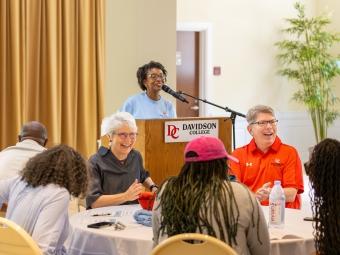
Fulfilling a Commitment
The Summer Promise Program started with a commitment Davidson made last fall.
In November 2023, the college announced the creation of the Committee on Education and Reconciliation and released a report that detailed the history of Maxwell Chambers, a money lender whose wealth largely was built off the institution of slavery and whose name adorns the central academic building.
With the report, the college also shared several initiatives to explore its history and build an inclusive Davidson community. One immediate step among many: Davidson pledged that it would launch a college-readiness program for local, underserved, high school-aged youth.
“This program is a part of Davidson's effort to grapple with its history. To think about the people who built the college and the enslaved Africans who toiled here,” Bailey said. “We want to reach out to people who would appreciate an opportunity like this to help them understand what Davidson is today and to do a little bit in the area of making things right.”
The program is not designed to promote Davidson College. The students were there to get a first-hand look at higher education.
“We believe that college readiness is fundamental to how students prepare for their lives as they think about high school connecting to college and life beyond,” Davidson College President Doug Hicks ’90 said. “We want our students in Charlotte to know that they have remarkable opportunities. We want to expand their horizons and help them to see the possibilities open for them.”
The announcement caught the eye of Duff Bruce, a 1972 graduate of Davidson.
In the mid-1990s, Bruce’s mother read a Davidson Journal article about “Love of Learning,” a college-readiness program at Davidson that started in 1987 and inspired generations of young Charlotteans to attend college. Bruce’s mother was so impressed by Davidson’s work that she, a resident of Greenville, South Carolina, decided to endow a similar program at nearby Furman University. “Bridges to a Brighter Future” has been in operation at Furman since 1997.
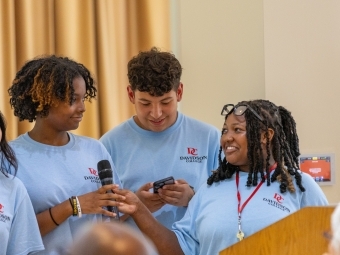
“As soon as I saw the news, I just thought, ‘Oh yeah, this is what I've been waiting for,’” Bruce said.
He picked up the phone the same day the college released the report on Chambers and committed to support the fledgling program.
“I was excited because it seemed so right to bring kids on campus that maybe have no idea they can go to college,” he said, “but they get the spark here.”
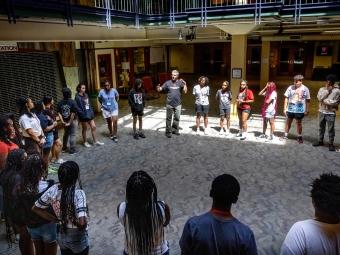
Lessons Beyond the Classroom
Bailey came aboard in January, charged with building the Summer Promise Program from the ground up. She partnered with the Charlotte Teachers Institute, a professional development organization for teachers in the Charlotte-Mecklenburg school district, pairing six teachers with six Davidson professors to make college material as accessible as possible.
She was guided by her own experience in high school.
“I had the opportunity to participate in the Governor's School for Academics at the College of Charleston in South Carolina,” she said. “And that program really opened my eyes to all that was available to me and really helped me make connections with young people who were a lot like me that I never would have met otherwise.”
Likewise, math professor Duhon credits the Duke Talent Identification Program for helping her see higher ed as an opportunity, instead of an obligation. She wanted her Summer Promise students to learn the same lesson.
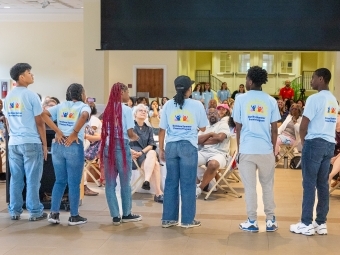
“A lot of them approach school as a chore because they have a mom or a dad who's forcing them into it,” she said. “But they have to think about this as an investment in themselves and a lot of times they are not taught that.”
In addition to step and math, Duhon slipped in other lessons on college life.
At one point, she paused to hold up a creased and crumpled worksheet, asking what was wrong with it. The students ventured a number of guesses but none mentioned the condition of the paper.
Finally, Duhon pointed out that an assignment that looks as if it was pulled out from the bottom of a backpack will be judged differently than a crisp, clean submission.
“This shows me that the person who did it didn’t pay a lot of attention,” she said. “The work may be great but when I’m grading, I’m automatically starting off with a negative view of it.”
Duhon’s combined teacher/coach role embodies the mission of the Summer Promise Program – the point is not necessarily for her students to acquire new math skills. The real lesson is to give them a sneak preview of what life could be like in college, which is only four years away.
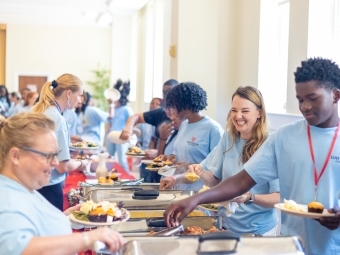
Taneilya “NeNe” Young was one of Duhon’s students and left the program excited by the idea of college.
“It was nice to get away and be a college student,” she said, “to feel like you've grown up.”
She also learned that the freedom of college life makes prioritizing academic and social life more important and more difficult.
“I want to go to college but I feel like I would definitely have to work on my time management,” she said.
And that’s exactly what the Summer Promise Program is supposed to teach.
“A lot of them have college as a dream, but didn't really have an idea about how they could actually make that dream come true,” Bailey said. “So for them, this program will be a gateway into their futures.”
Bailey said the fulfillment of that dream could have consequences far beyond each individual student.
“We hope that higher education will give them the opportunity to give back to their communities,” she said, “and strengthen others as well as themselves.”



